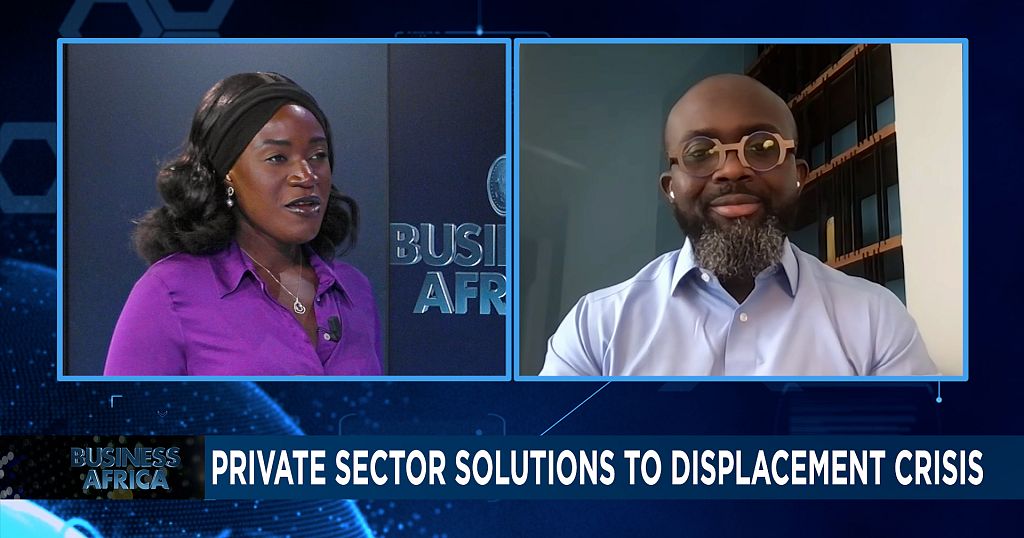
The displacement crisis in Africa has seen a significant rise, with the number of forcibly displaced persons (FDPs) increasing from 36 million in 2021 to 45 million in 2023.
This crisis extends beyond immediate humanitarian concerns, exerting a profound economic impact on regions already contending with instability.
The conflict in Sudan serves as a poignant example, with predictions of a 12% economic decline. This not only affects Sudan but has far-reaching consequences on neighbouring nations, disrupting global commodity markets.
The interruption of trade between Sudan and Egypt, reduced Ugandan coffee imports, and the disruption of air routes for Nigerian carriers highlight the widespread economic repercussions.
Amidst this, there is a growing recognition of the vital role the private sector can play in offering sustainable solutions. The private sector’s involvement in areas hosting refugees or Internally Displaced Persons (IDPs) is crucial.
Mr. Isaac Kwaku Fokuo, co-founder of the Amahoro coalition, took the time to provide insights into the economic impact of the displacement crisis in Africa and the role the private sector can play in mitigating these challenges.
What is the significance of the economic impact of the displacement crisis in Africa?
Isaac Kwaku Fokuo: Economic losses are notably significant on the continent, often overlooked in discussions that tend to focus on the humanitarian aspect rather than the economic losses incurred. In Sudan alone, we will witness a substantial 12% decrease in the economy in 2023. This figure holds significant weight for a country centrally positioned in the Horn of Africa, impacting numerous neighbouring nations. The ripple effect on its neighbours is equally substantial; civil unrest in Sudan has led to a sharp decline in Kenya’s tea exports, affecting employment, GDP, and more. These instances underscore how conflicts and displacement profoundly impact economies, not only in the country of occurrence but also in nations involved in exporting and importing.
How can private sector-led intervention contribute to mitigating the displacement crisis in Africa, and why is it important to do so?
IKF: The private sector, despite commendable efforts by governments and humanitarian organizations, plays a pivotal role in addressing this crisis. The African private sector has experienced significant growth in the past two decades, with substantial capital invested in African economies. Private sector involvement is twofold: firstly, it is an investment in economic activity rather than charity. Stability in nation-states is crucial for business operations. Secondly, it is an investment in the workforce of tomorrow. Businesses investing in conflict areas are investing in future workforces, contributing to the infrastructure of those countries for smoother business operations. Lastly, it is a moral imperative; doing good ensures collective progress for the Africa we aspire to build.
There have been cases of collaborations with the private sector, but sustainability remains a challenge. What needs to be done differently?
AFCON: economic turning point for Ivory Coast?
The Africa Cup of Nations (AFCON) 2024 is emerging as a significant economic catalyst for the Ivory Coast, with the tournament’s thrilling matches creating a positive impact on various sectors. Beyond the competitive on-field encounters, AFCON has sparked a heightened demand for extraordinary experiences, prompting entrepreneurs in the entertainment, accommodation, and fashion industries to strategically leverage this opportune moment. Despite grappling with several economic challenges, including inflation, a 10% surge in electricity prices, unemployment, and disparities in access to education and essential goods, these ventures are actively capitalizing on the economic boost generated by this prestigious sporting event.
Angola’s exits OPEC over oil production quotas
Angola has officially decided to exit OPEC due to disagreements over oil production quotas. The decision, made during a Council of Ministers session chaired by President Joao Lourenco, reflects Angola’s reluctance to comply with OPEC’s production cuts, which contradicts the country’s policy of avoiding output reduction and honoring contractual commitments.
This unexpected departure has triggered geopolitical ripples, prompting questions about the consequences and implications for the Central African country. As the energy sector closely monitors this development, concerns arise about how Angola’s decision will impact its standing in the international oil landscape and influence the broader dynamics within OPEC and OPEC+.
Read More: World News | Entertainment News | Celeb News
African News



